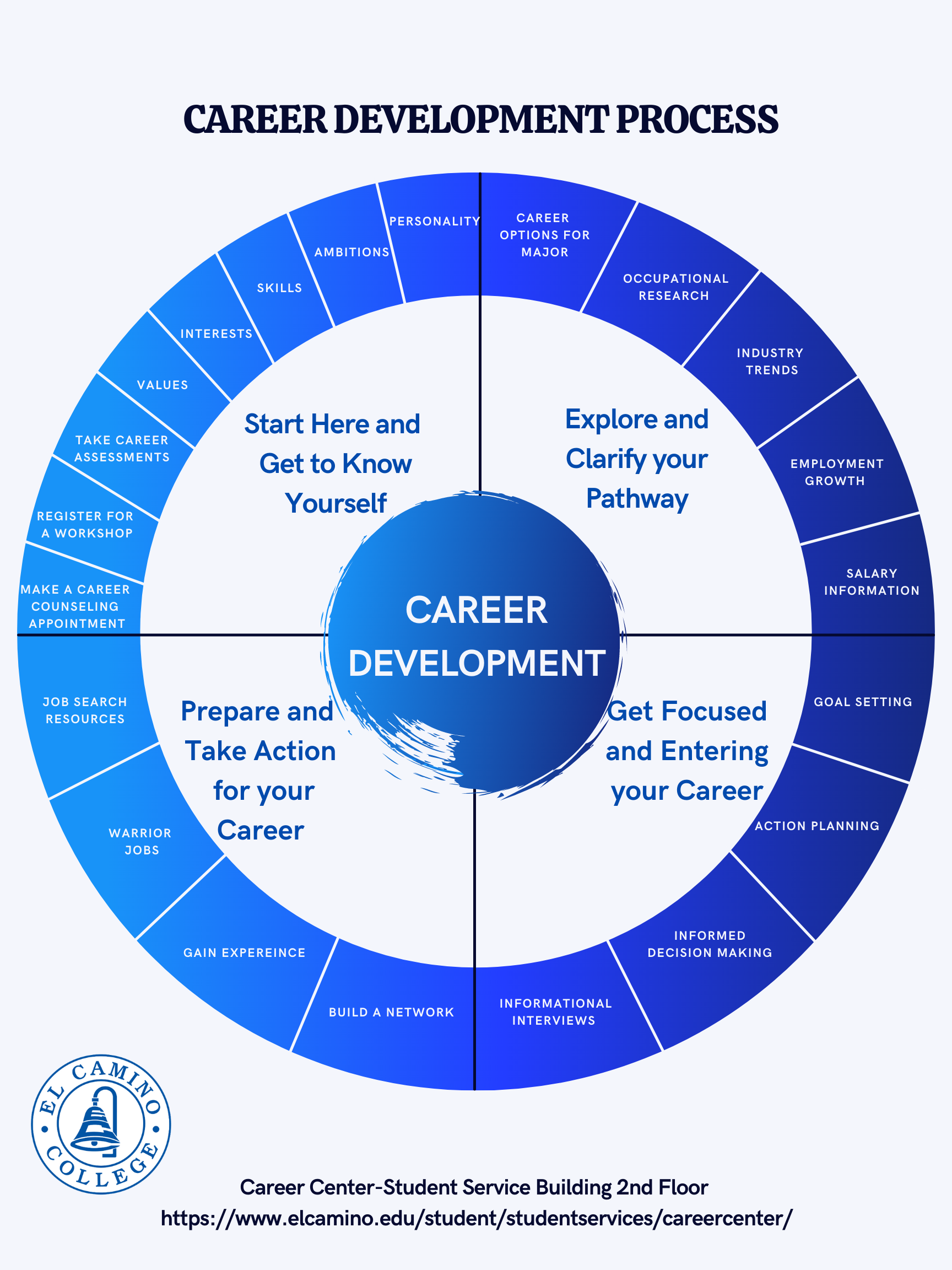
Getting Started
I Want Help Choosing a Major or Career
Career Counseling is here to support you. Whether you're undecided, exploring, or feeling stuck — let’s talk.
Please review the content on this page to start thinking and finding support on your career
Within our one-on-one appointments, we may discuss the following:
- Your interests, strengths, values, personality and how it relates to careers and majors
- Appropriate career and major resources for career research and reflection
- Job search guidance and strategies
- Resume review, interview preparation (including mock interviews), and networking skill development
- NOTE: Career Counseling is NOT focused on academic planning/ picking classes for the semester
To schedule a career counseling appointment, do one of the following:
- Complete the Career Center Counseling Appointment Request Form or
- Call 310-532-3670, ext. 6137
Career Center Hours:
Located in the Communications Building, room 206
- Monday: 10:00 am - 5:00 pm
- Tuesday: 9:00 am - 5:00 pm
- Wednesday: 9:00 am - 5:00 pm
- Thursday: 9:00 am - 5:00 pm
- Friday: Closed
Not Sure Where to Start? Let’s Explore Your Future.
Start by learning what a career really means, setting goals that make sense for you, and discovering programs and resources that fit your path. Let’s take it one step at a time.
“I Don’t Know Where to Start."
Learn what a career is, reflect on what matters to you, and begin building your own definition of success.
Take a moment to slow down and check in with yourself. These questions are here to help you explore what matters to you — not just in work, but in life. Be patient, honest, and open. There’s no “right” answer — just what feels true for you.
Use the questions below to spark meaningful reflection:
What led you to choose college — and why now?
What activities make you lose track of time?
What problems in the world (or your community) do you feel drawn to solve?
What skills or knowledge are you excited to develop?
When choosing electives, how do you decide which classes to take?
Who inspires you — and what about their career or values speaks to you?
What kind of lifestyle do you want to have (schedule, income, freedom, etc.)?
What are your short-term priorities? What about your long-term ones?
What can you do with your time that feels meaningful or important to you?
Where do you imagine yourself in 5, 10, or 20 years?
What does a happy, fulfilling career look like for you?
How will you know when you’ve found it?
The career development process is a lifelong journey of understanding yourself, exploring options, making decisions, and taking action toward building a meaningful and fulfilling career. It’s not about choosing one job for life — it’s about growing, adapting, and learning as your interests and goals evolve.
You’ll cycle through these stages many times — not just once. As your interests, life circumstances, and the world of work change, so will your career path. And that’s completely normal.
Here is a visual version of this cycle

Keep these concepts in mind throughout your career journey
Difference between Job, Occupation and Career Defining Career Further Career Myths Additional Career Advice
"What Should I Study?"
Understand the difference between degrees, certificates, and transfer — and explore options that match your interests.
Consider what is your educational goal here:
- Earn a Degree or Certificate
- Transfer
- Personal Learning? Other?
Use this worksheet to organize your educational goals
If you are not sure, ask what you are open to pursuing.
If you are just considering an Associates degree or Certificate here at ECC, review our degrees and certificates by division via our catalog to consider your options
ECC Degrees and Certificates by DivisionIf you are considering transfer for a bachelor's degree at a University, please visit the Transfer Center page to learn more about transfer
Transfer CenterVisit Transferbound to see what majors are available for transfer at California public
institutions of higher education (UC, CSU)!
This is a tool for exploration - Please see a counselor at your community college for academic and educational planning
SMART Goals are a powerful tool to help you set clear, realistic, and achievable objectives — whether you're planning your career, choosing a major, or improving a skill. The SMART framework turns vague ideas into focused, actionable steps.
⭐ What Does SMART Stand For?
| Letter | Stands For | What It Means |
|---|---|---|
| S | Specific | Be clear and precise. What exactly do you want to accomplish? |
| M | Measurable | How will you know you’ve succeeded? Use numbers or clear results. |
| A | Achievable | Is your goal realistic given your current situation and resources? |
| R | Relevant | Does this goal connect to your bigger plans or values? |
| T | Time-Bound | Set a deadline. When will you complete this goal? |
✅ Example (Vague vs. SMART)
❌ "I want to find a job."
✅ "I will apply to 3 internships in digital marketing by the end of this month."
🎯 Why SMART Goals Matter for Students
-
They reduce overwhelm by breaking goals into manageable pieces
-
They help you track your progress and stay motivated
-
They connect your daily actions to your long-term dreams
SMART GOALS WORKSHEET
Here at El Camino College, we have a wide variety of classes to choose from. If you are interested in taking a class to explore your personal, major, and/or career interests, we RECOMMEND review the following document that features courses you could explore from.
Major and Career Exploration Courses at ECCAs soon as you decide on the course of study that’s right for you and your goals,
you can move to that degree program with some of your required courses already completed.
Meta Majors at ECC
Meta-majors at ECC are sets of programs designed around seven broad subject areas to let you explore your options while earning credits in courses required for any degree you choose.
Click here to learn more about the Meta-Majors at ECC
ECC Meta Majors